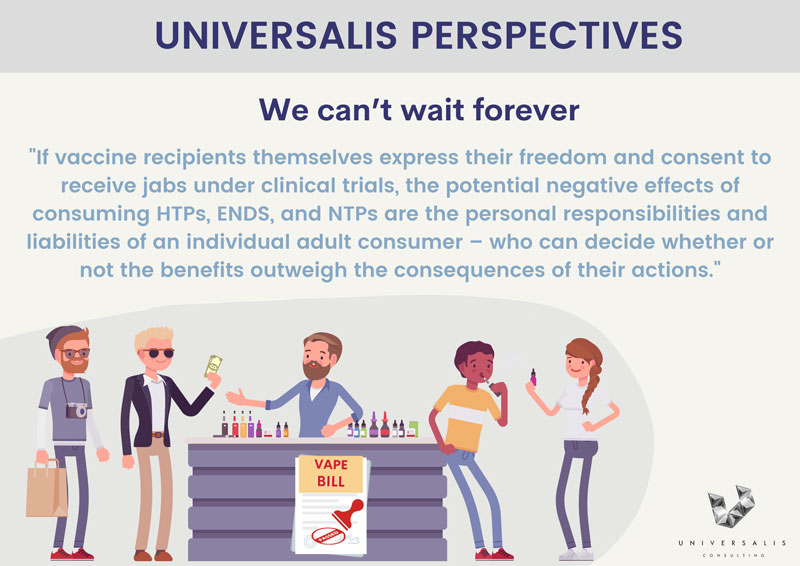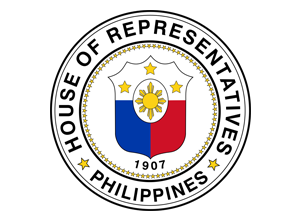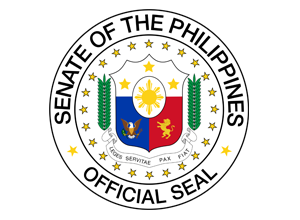Universalis Perspectives: We can’t wait forever

After years of deliberation and debate, the Senate passed on Third Reading the controversial vape bill opposed by medical and healthcare advocates in the country last December 2021. This month, bicameral ratification is expected to take place between the Senate and House of Representatives before forwarding the final version of the bill to Malacañang.
Commonly referred as the “vape bill”, the new regulation covers both heated tobacco products (HTPs), electronic nicotine delivery systems (ENDS) and other novel tobacco products (NTPs). While the regulation is now one step away from being a law, the opposition coming from the health sector is getting stronger and louder. The campaign urging the President to veto the bill is intensifying not only from medical circles but also from concerned non-governmental organizations.
The Philippine version of such a regulation is found to be unique because of its three elements. First, the prescribed minimum age of purchase was designated at 18 years old. Second, while other territories are attempting to limit e-cigarette flavors, the Philippine version did not hinder the entrance of flavors. Instead, the current version of the impending law prohibits manufacturers to place attractive flavor descriptors to prevent enticing children. Lastly, the sole jurisdiction of regulating e-cigarettes, HTPs and novel tobacco products is now placed under the watch of the Department of Trade and Industry (DTI) – a function being coveted by the health advocates to be assigned to the Food and Drug Administration (FDA).
It appears that the health and medical advocates failed to grasp the benefits and opportunities provided by the impending law. Borrowing the words of senator proponents, the approved regulation on HTPs, ENDS, and NTPs is indeed a legacy, a potential model that both business interests and public health considerations are possible to be harmonized.
Concerning the age limit, it is necessary to re-affirm that the Tobacco Regulation Act and other concerned Philippine laws assert that the age of consent starts with 18 years old. What is special with vaping and other novel tobacco products? It shouldn’t be any different.
In terms of flavoring, the legislated regulation went further and put several restrictions in terms of physical and online advertisement, product communications, point-of-sale, and distributor activities. Minors themselves cannot purchase e-cigarettes and novel tobacco products without presenting a government-issued identification card to confirm their age.
Lastly, while the DTI was given the sole jurisdiction to regulate these products, the law itself required the body to regularly consult with the expertise offered by the FDA. The law itself did not remove nor decimate the crucial role of FDA in examining and regulating the chemical substances used inside e-cigarette devices and forthcoming novel tobacco products.
Another contention raised by the opposition against the impending regulations is the conflicting accounts and studies about the safety of consuming these products to the health of every individual. While there are published studies skeptical about their safety, there are also a growing volume of anecdotal reports and statements of medical opinion about the potential of these products to serve as alternative devices for smoking cessation.
Some medical experts and health advocates dismiss these claims by arguing that comprehensive studies about the long-term effects of these products are not yet available. Unfortunately, these studies will take years and decades due to factors such as research funding, availability of research subjects, and even ethical considerations. However, the presence of these products in the market is already a reality and the government should intervene to regulate and ensure their compliance to product standards. Waiting for another set of years or decades to affirm whether these products are harmful or not is detrimental not only to the tobacco industry itself but to the healthcare system of the country. Like it or not, the manufacturing of these products will continue despite explicit ban. The underground markets might even take the ban as an opportunity to smuggle and discreetly sell sub-standard products. Thus, creating more patients with chronic disorders needed to be treated by the healthcare sector.
Policymaking is a compromise. Take the case of COVID-19 vaccines. All vaccines produced undergo rigorous clinical trials to test their efficacy and safety. However, the emergency brought by COVID-19 enabled several countries to gamble with some vaccine brands in which safety and efficacy studies were only published after a year. In addition, aren’t all humans taking a risk to receive the vaccine in order to prevent severe symptoms from COVID-19? In fact, vaccine recipients are asked to sign a waiver releasing vaccine manufacturers from liabilities in case adverse reactions occur. However, the government has a safeguard in place to provide compensation for Filipinos who will suffer from adverse symptoms from the vaccine.
Isn’t this the same scenario with HTPs, ENDS and other NTPs? The government did its part to regulate the quality of these products by providing several restrictions to protect certain segments of population. If vaccine recipients themselves express their freedom and consent to receive vaccines under clinical trials, the potential negative effects of consuming HTPs, ENDS, and NTPs are the personal responsibilities and liabilities of an individual adult consumer – who can decide whether or not the benefits outweigh the consequences of their actions.


